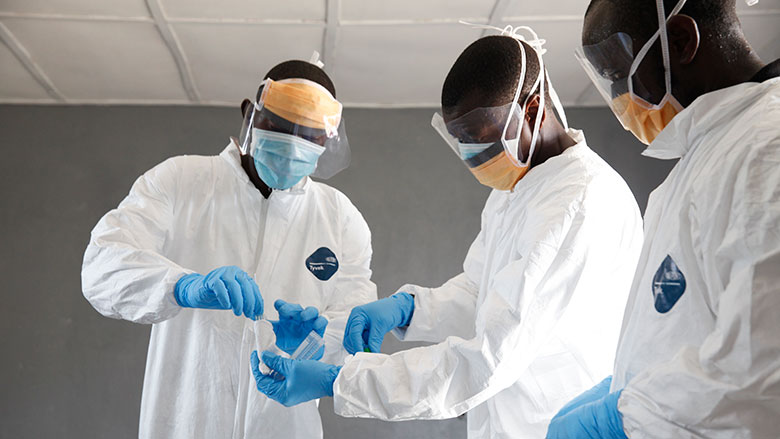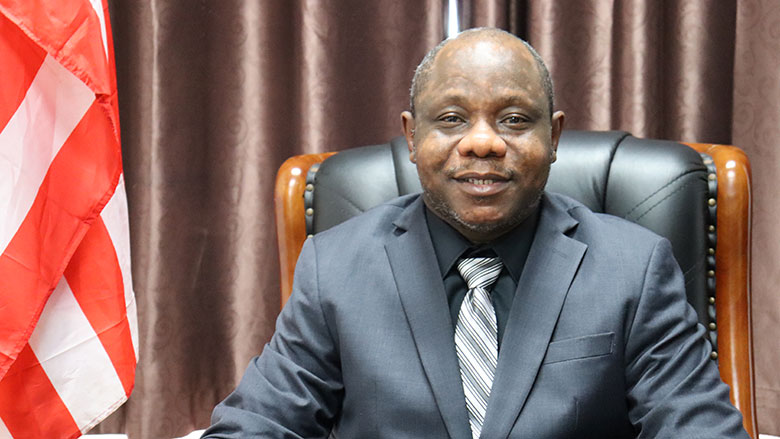It has been about a year since the first COVID-19 case was detected in Liberia. With the recent Ebola outbreak in Guinea and the third wave of coronavirus cases, what lessons did you learn in terms of preparedness and response?
We employed many of the lessons we learned fighting Ebola in our COVID-19 response. First, we took immediate, decisive action to prevent the spread of disease. We were among the first countries in Africa to close our borders and go into a general lockdown. Second, we embarked on a massive communication campaign to educate our people about the seriousness of COVID-19 and the need to take preventive measures, like hand washing, social distancing, and wearing a mask. We worked closely with community leaders to make sure these messages resonated on the ground. Finally, we acted fast to develop a preparedness plan and mobilize resources to implement it. We were able to trace, test, isolate, and treat COVID-19 cases quickly and we continue to do so.
What are the priorities for reform and for building a resilient recovery in Liberia?
As the situation stabilizes, our goal is to increase growth that is sustainable and inclusive. That means increasing the productivity of the agriculture sector and linking farmers to urban and regional markets through better roads and transportation infrastructure. It also means increasing access to clean and affordable electricity, particularly in rural areas, and digitizing our economy, especially through digital finance.
All this necessitate significant government spending, which is why we are strengthening domestic revenue mobilization and public expenditure management to increase transparency and efficiency. We also plan to better leverage our significant natural resources to support this change process. All Liberians must prosper in this transition. To ensure nobody is left behind, we are reforming our social protection system to create a new Liberia Household Social Registry, which will help us identify vulnerable populations and reach them in times of need.
Currently, the electricity tariff in Liberia is among the highest in the world. What efforts are being made to improve energy access for Liberians, local businesses, and essential services across the country?
We are working to break this vicious cycle of high tariffs. People steal electricity because the tariff is so high, but that deprives revenue to the utility company, Liberia Electricity Corporation. It is then forced to raise the tariff even higher just to keep operating. The utility has not been able to connect all potential customers to the grid in a timely manner, creating further impetus for illegal connections.
It is our goal to provide affordable, reliable, and sustainable electricity to all Liberians by 2030. We are investing in grid densification and rehabilitation to connect all remaining households in communities already covered by the grid, and we are expanding the grid to reach the greater Monrovia area and the main corridor of the regional electricity interconnection project with Côte d’Ivoire, Liberia, Sierra Leone, and Guinea. We are also exploring renewable energy mini-grids and stand-alone solar systems in very remote areas and taking measures to create an enabling environment for private sector participation. Donor support from the World Bank, Japan and other partners is also helping us prioritize energy access for health facilities to increase the quality of service and resilience of our healthcare system.
Recent analysis has shown that over half a million Liberians are at risk of falling into poverty as a result of the pandemic. What is being done to protect the most vulnerable and to help create jobs?
Early in the pandemic, we worked with development partners to provide emergency food support and other immediate economic relief to the most vulnerable populations. We are now working to tackle the employment challenge within the urban informal sector of the densely populated Montserrado county. This is where the most COVID-19 cases have been reported and where lockdown measures have devastated the livelihoods of men and women typically engaged in informal work like street selling, small trade, and day labor. We aim to provide a package of financial and non-financial support to revive small businesses, encourage entrepreneurship, and help informal workers build skills and find jobs. Labor-intensive public works developed with communities can help achieve this goal while also improving infrastructure and promoting social cohesion. The ongoing Liberia Youth Opportunities Project will also provide business stimulus grants to help beneficiary youth businesses stay afloat during the COVID-19 crisis.
How is World Bank’s International Development Association (IDA) supporting Liberia in its recovery efforts?
Since the beginning of the pandemic, a total package of over $200 million in IDA resources are being mobilized through several projects in energy, agriculture, roads, commerce, finance, health, and social protection, to help stimulate economic activities and strengthen Liberia’s infrastructure and institutional platform for more sustainable economic recovery and growth. This timely, strategic support will help us get informal workers back to work and small businesses back on their feet. It will help rural agri-businesses produce and sell more. It will accelerate our efforts to improve roads, increase access to affordable reliable electricity, and improve health services to respond more effectively to future pandemics. This past year has been challenging, but partners like the World Bank are supporting us and we are moving ahead on the road to resilience.


